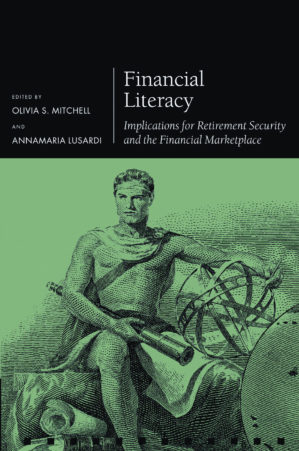Olivia S. Mitchell and Annamaria Lusardi, Editors
As financial markets grow ever more complex and integrated, households must make increasingly sophisticated and all-too-often irreversible economic decisions. This is particularly evident in retirement decision-making. Traditional defined benefit pension schemes are being replaced with defined contribution pensions; employer and government judgment regarding how much to save and where to invest has been replaced by employees having to make these choices on their own (sometimes assisted by advisers); and retirees have become responsible for managing their own pension assets.
This volume explores how financial literacy can enhance peoples’ ability to make informed economic choices. It proposes that financial literacy determines how well people make and execute saving, investing, borrowing, and planning decisions. It examines causality using controlled settings to disentangle whether financial literacy causes saving or vice versa, and demonstrates that financial education programs do indeed enhance financial decision-making and asset accumulation.
Publication date: November 2011 · Oxford University Press · ISBN 0-19-969681-9
- Order online from Oxford University Press
- Table of Contents
- Chapter 1: The Outlook for Financial Literacy
Annamaria Lusardi and Olivia S. Mitchell - Chapter 2: Financial Literacy and Planning: Implications for Retirement Well-being
Annamaria Lusardi and Olivia S. Mitchell - Chapter 3: Pension Plan Distributions: The Importance of Financial Literacy
Robert L. Clark, Melinda S. Morrill, and Steven G. Allen - Chapter 4: Financial Literacy and 401(k) Loans
Stephen P. Utkus and Jean A. Young - Chapter 5: Financial Illiteracy and Stock Market Participation: Evidence from the RAND American Life Panel
Joanne Yoong - Chapter 6: Fees, Framing, and Financial Literacy in the Choice of Pension Manager
Justine Hastings, Olivia S. Mitchell, and Eric Chyn - Chapter 7: Investor Knowledge and Experience with Investment Advisers and Broker-Dealers
Angela A. Hung, Noreen Clancy, and Jeff Dominitz - Chapter 8: Pecuniary Mistakes? Payday Borrowing by Credit Union Members
Susan P. Carter, Paige M. Skiba, and Jeremy Tobacman - Chapter 9: Annuities, Financial Literacy, and Information Overload
Julie Agnew and Lisa Szykman - Chapter 10: Financial Counseling, Financial Literacy, and Household Decision-Making
Sumit Agarwal, Gene Amromin, Itzhak Ben-David, Souphala Chomsisengphet, and Douglas D. Evanoff - Chapter 11: Time Perception and Retirement Saving: Lessons from Behavioral Decision Research
Gal Zauberman and B. Kyu Kim - Chapter 12: Making Savers Winners: An Overview of Prize-Linked Saving Products
Melissa S. Kearney, Peter Tufano, Jonathan Guryan, and Erik Hurst - Chapter 13: How to Improve Financial Literacy: Some Successful Strategies
Diana Crossan - Chapter 14: Bringing Financial Literacy and Education to Low- and Middle-Income Countries
Robert Holzmann - Chapter 15: Improving Financial Literacy: The Role of Nonprofit Providers
J. Michael Collins - End Pages and Index
- More PRC Books



